How to protect a child from bad AQI

Only For Pro
Reviewed by expert panel
As a parent, you want the best for your child. You want them to be healthy, happy, and successful. You want them to grow up in a safe and clean environment. What if I told you that the air they breathe every day is putting their health and development at serious risk? Do you know that 90% of the world’s children under the age of 15 years are exposed to air pollution that is so toxic it can cause respiratory problems, neurological problems, cancer, and even death? The effects of air pollution on your child's development are indeed very damaging. What would you do about it?
In this blog post, we will share with you some facts and figures about how air pollution is affecting the health and development of your child and what you can do to protect your child and yourself from its harmful effects. we hope that by reading this blog post, you will become more aware and informed about the bad air quality that is affecting millions of children around the world.
Why are children more vulnerable to bad AQI
Children are more vulnerable to the effects of air pollution than adults because they have several biological and behavioral characteristics that make them more exposed and more susceptible to the harmful substances in the air. Some of these characteristics are:
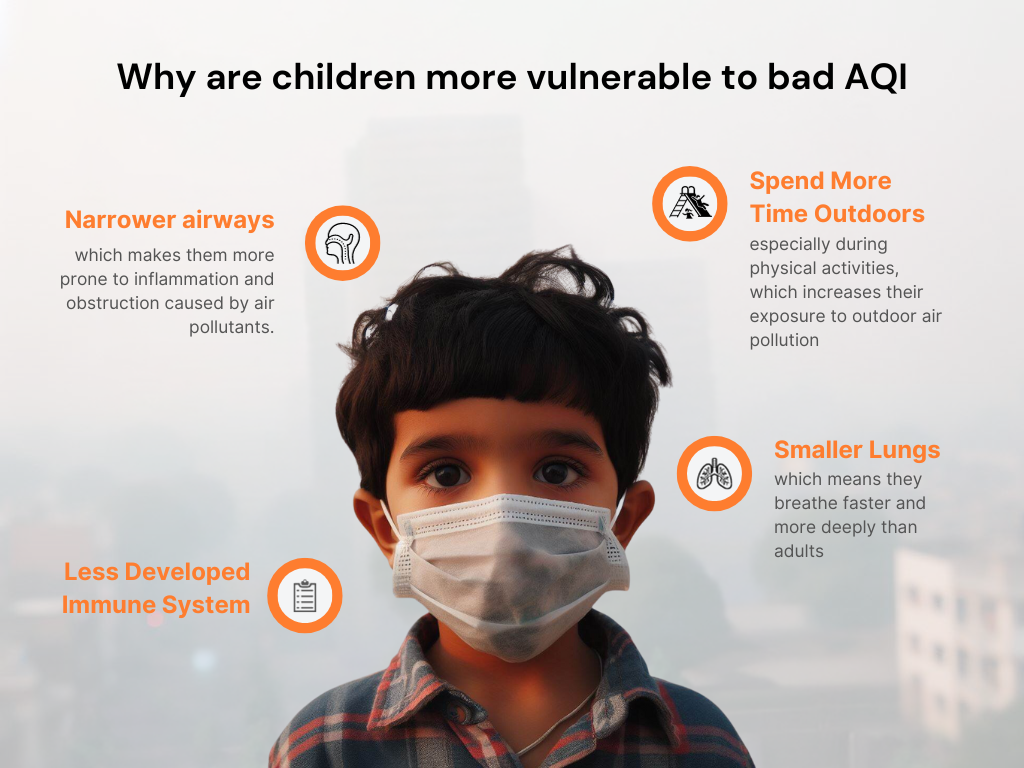
-
Children have smaller and developing lungs, which means they breathe faster and more deeply than adults, and therefore inhale more air pollutants per unit of body weight.
-
Children have narrower airways, which makes them more prone to inflammation and obstruction caused by air pollutants.
-
Children have a less developed immune system, which makes them less able to fight off infections and diseases triggered or worsened by air pollution.
-
Children spend more time outdoors than adults, especially during physical activities, which increases their exposure to outdoor air pollution.
-
Children are exposed to indoor air pollution from sources such as cooking, heating, lighting, and tobacco smoke, which can be more harmful than outdoor air pollution in some settings.
How does air pollution affect your child’s health and development
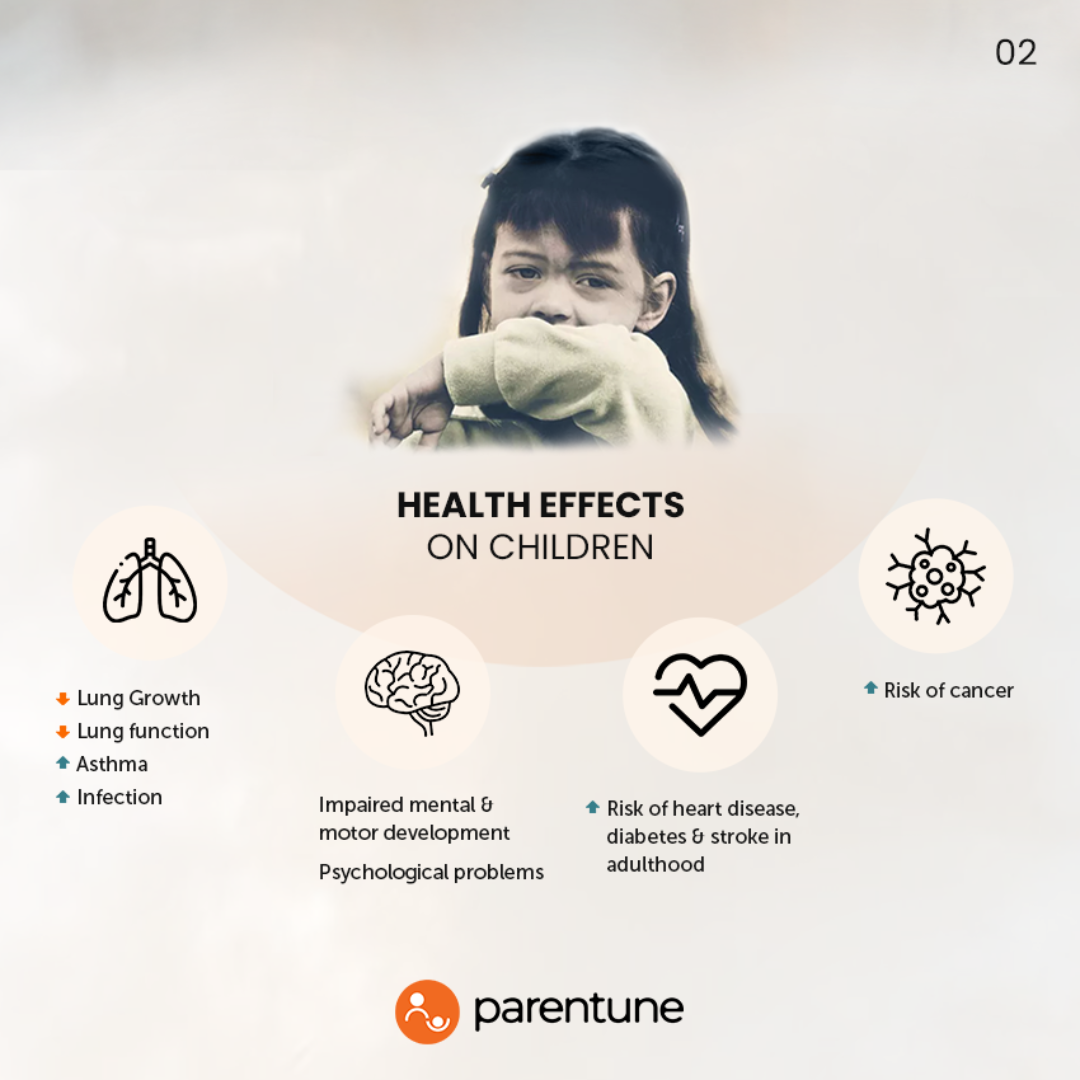
Air pollution can have a range of negative impacts on children’s health and development, both in the short term and in the long term. Some of the serious effects are:
1. Respiratory problems:
Air pollution can cause or worsen respiratory conditions such as asthma, bronchitis, pneumonia, and other lower respiratory infections. These conditions can impair children’s lung function, reduce their oxygen intake, and increase their risk of hospitalization and death.
According to the WHO, air pollution was responsible for 543,000 deaths among children under five years of age due to lower respiratory infections in 2016.
2. Cardiovascular problems:
Air pollution can affect children’s heart and blood vessels, increasing their risk of high blood pressure, heart attack, stroke, and other cardiovascular diseases. Air pollution can also damage the endothelium, the inner lining of the blood vessels, which can lead to atherosclerosis, a condition that narrows and hardens the arteries and reduces blood flow. Air pollution can also cause inflammation and oxidative stress, which can damage the heart muscle and the electrical system that regulates the heartbeat.
3. Neurological problems:
Air pollution can affect children’s brain development and function, impairing their cognitive abilities, learning outcomes, and behavior. Air pollution can also increase the risk of neurological disorders such as autism, attention deficit hyperactivity disorder (ADHD), and Alzheimer’s disease.
Air pollution can affect the brain through several mechanisms, such as reducing the blood flow and oxygen supply, disrupting the blood-brain barrier, altering the neurotransmitters and hormones, and inducing inflammation and oxidative stress. Air pollution can also affect the development of the brain in utero, affecting the fetal growth and the formation of the neural networks.
4. Cancer:
Air pollution can increase the risk of cancer in children, especially leukemia and brain cancer. Air pollution can cause cancer by damaging the DNA and the genes, interfering with the cell cycle and the apoptosis, and stimulating the growth of tumors.
Air pollution can also affect the immune system and the hormonal balance, which can influence the development and progression of cancer. Some of the air pollutants that are known or suspected to be carcinogenic are benzene, formaldehyde, polycyclic aromatic hydrocarbons (PAHs), and particulate matter.
Can air pollution affect a child’s behaviour
Air pollution can also affect a child’s behaviour, mood, and mental health. Some of the possible effects are:
1. Anxiety and depression:
Air pollution can increase the risk of anxiety and depression in children, affecting their emotional well-being and social interactions. Air pollution can cause anxiety and depression by altering the levels of serotonin, dopamine, and cortisol, which are neurotransmitters and hormones that regulate mood, stress, and motivation. Air pollution can also induce inflammation and oxidative stress, which can affect the brain function and structure and can also affect the quality of sleep, which can affect the mood and the mental health.
2. Aggression and violence:
Air pollution can increase the risk of aggression and violence in children, affecting their behaviour and their relationships. Air pollution can cause aggression and violence by increasing the levels of testosterone, which is a hormone that influences aggression, dominance, and impulsivity.
Air pollution can also affect the prefrontal cortex, which is the brain region that controls executive functions, such as planning, decision making, and impulse control, and can also affect the amygdala, which is the brain region that processes emotions, such as fear, anger, and aggression.
3. Hyperactivity and impulsivity:
Air pollution can increase the risk of hyperactivity and impulsivity in children, affecting their attention, concentration, and learning. It can cause hyperactivity and impulsivity by affecting the levels of dopamine, which is a neurotransmitter that regulates reward, motivation, and movement.
Air pollution can also affect the striatum, which is the brain region that controls motor activity, habit formation, and reinforcement learning. Air pollution can also affect the cerebellum, which is the brain region that coordinates movement, balance, and cognition.
What You Should Do When AQI Is Bad
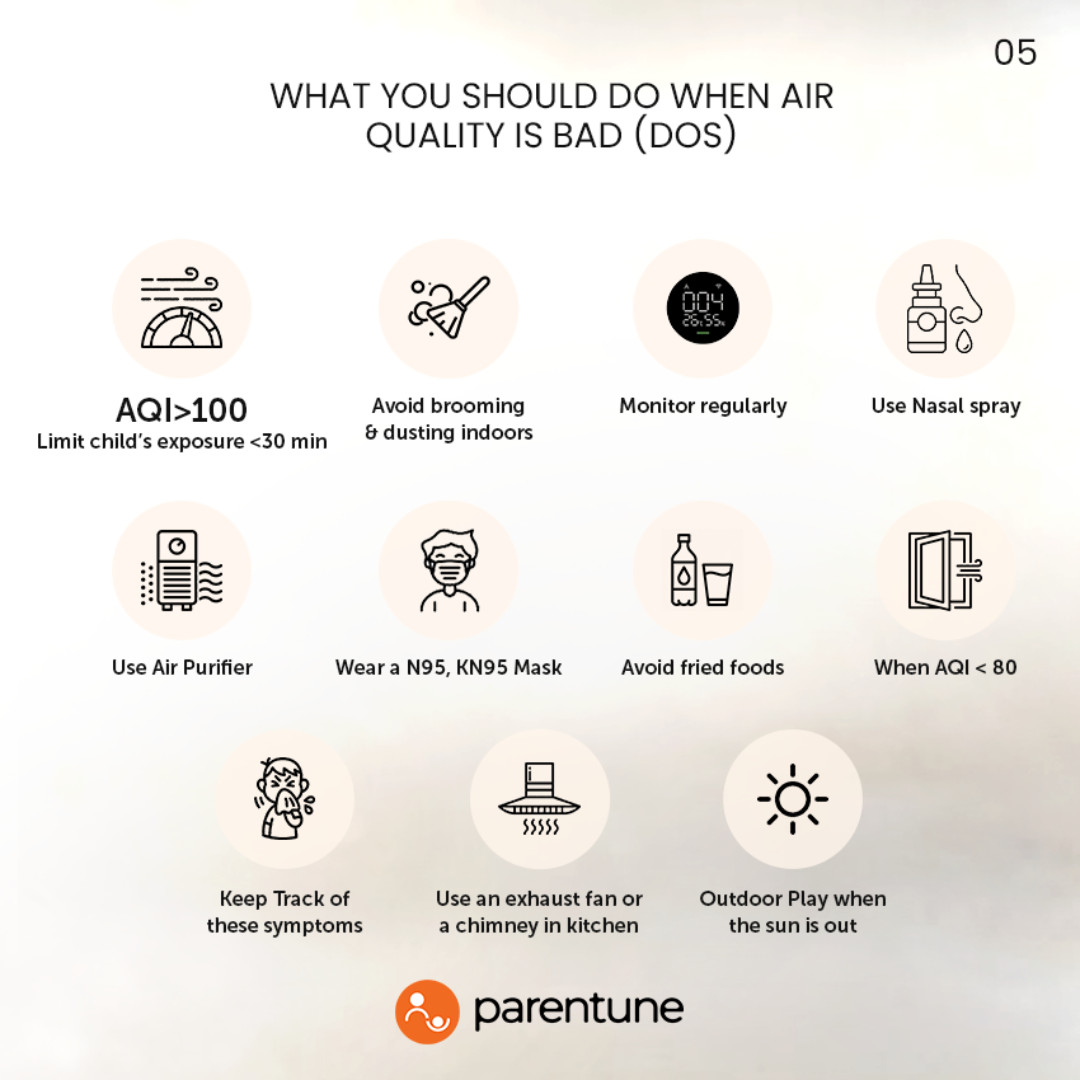
1. Limit your child’s outdoor activities and exposure to under 15-30 minutes when AQI is more than 150, such as in the morning and evening.
2. Avoid brooming, and dusting indoors. Use a vacuum cleaner inside and use a mask while doing any kind of cleaning/dusting activity.
3. Monitor the air quality index (AQI) regularly. The AQI is a measure of how polluted the air is and how it may affect health. The higher the AQI, the worse the air quality.
4. Use an air purifier at home. An air purifier can filter out the fine particles and other pollutants in the air and improve indoor air quality. You can choose an air purifier that has a high-efficiency particulate air (HEPA) filter and a clean air delivery rate (CADR) that matches the size of your room.
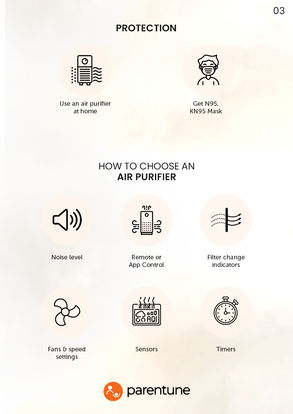
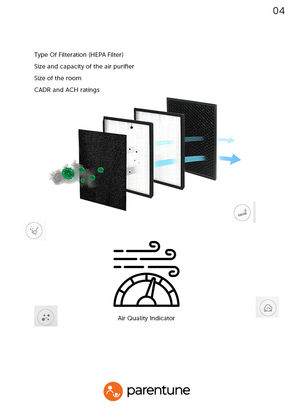
5. Wear a mask when going outside. A mask can protect you and your child from inhaling the harmful pollutants in the air. You can choose a mask that has a N95 or N99 rating, which means it can filter out 95% or 99% of the fine particles in the air. Best air pollution mask for your child - KN95, N95, KF94, FFP2, N99
6. Drink plenty of water and eat healthy foods. Water can help flush out the toxins from your body and keep you hydrated. Healthy foods can boost your immune system and reduce inflammation. Food such as: rich in antioxidants, fruits, vegetables, nuts, seeds, and green tea
7. Nasal spray- It helps in clearing the nose of any pollutants and reduces the chances of any infections. Can be used every time the child steps out in polluted air.
8. Ventilate your home when the air quality is better. Ventilating your home can help circulate the air and remove the stale air, but only do it when the air pollution is low, such as between 12 noon to 4 pm. You can also use plants, humidifiers, or salt lamps to purify and moisten the air in your home. Check the AQI before doing it.
9. Keep track of your child’s health and symptoms, such as coughing, wheezing, sneezing, runny nose, sore throat, or fever. You should also check your child’s peak flow meter or oximeter readings, if you have them, to measure their lung function and oxygen level.
10. Guidelines for giving water to your child:
- Babies aged 6 to 12 months should drink one to one and a half cups of water a day. Children aged 12 to 24 months should drink one to four cups of water a day.
- Children up to 3 years of age should drink about 5 to 6 cups of water a day.
- Children aged 5 years should be given 5 to 6 cups of water a day.
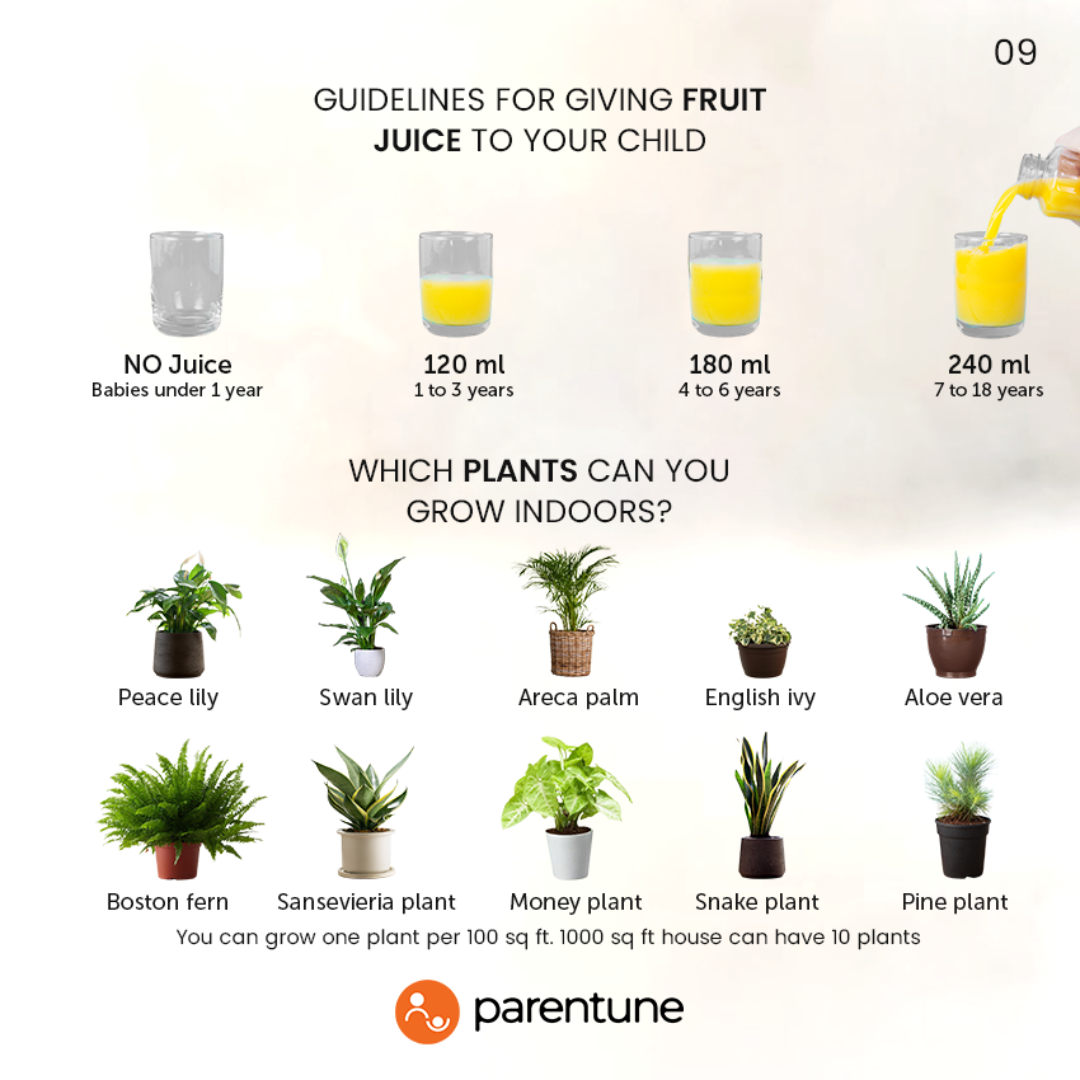
11. Guidelines for giving fruit juice to your child:
- Babies under 1 year of age should not be given juice
- Children aged 1 to 3 years can have about 120 ml of juice
- Children aged 4 to 6 years can have 120 to 180 ml of juice
- Children aged 7 to 18 years can have a maximum of 240 ml of juice
12. Foods You Must Include In Your Diet:
Vitamin C- orange, amla, guava, green vegetables Vitamin E- olive oil, sunflower oil, almond Natural anti-allergic- pineapple, kiwi, onion, fish, black pepper, carrot, radish Omega 3- fenugreek, mustard, kidney beans, black chickpeas
13. Take special care of your newborn baby
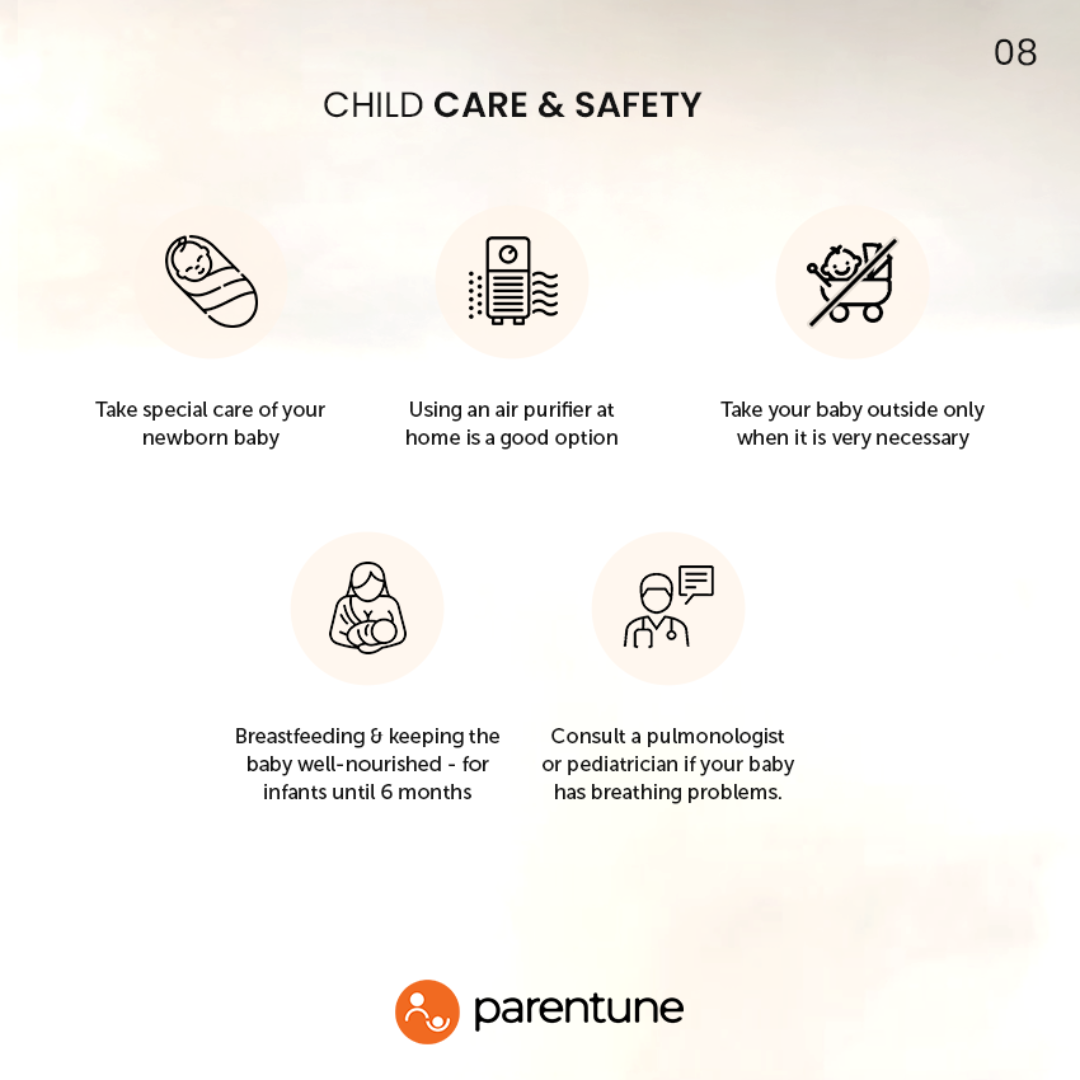
- Using an air purifier at home is a good option.
- Take your baby outside only when it is very necessary.
- Mother’s feed - Breastfeed milk builds immunity and strengthens the baby’s lungs and respiratory system.
- Consult a pulmonologist or pediatrician if your baby has breathing problems.
14. Do not burn the garbage around you Follow the 3 R (Reduce, Reuse, and Recycle) of waste management.
What You Should Not Do When AQI Is Bad
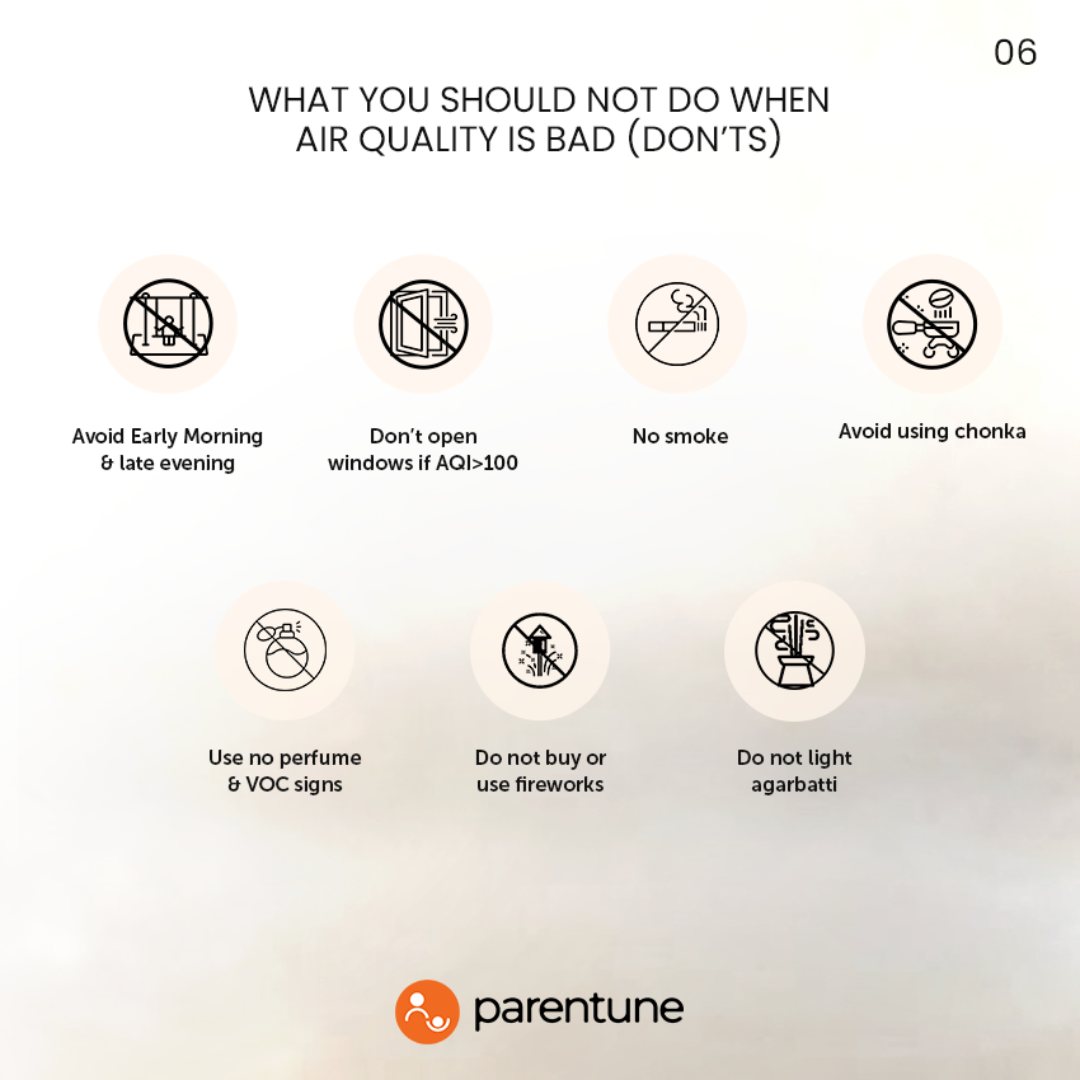
-
Avoid outdoor morning and late evening walks, running, jogging, and physical exercise. Because AQI is worse in the early mornings and night.
-
Do not open external doors and windows during morning and late evening hours. May ventilate if necessary between 12 noon to 4 pm, if the AQI improves.
-
Never let anyone smoke inside your house, even if they are in another room or near an open window or a fan, especially if you have a baby, a child, or a pregnant woman in your family.
-
Do not use perfumes, paints, or other products that contain volatile organic compounds (VOCs). VOCs are chemicals that evaporate easily and can pollute the indoor air.
-
Do not buy or use fireworks or crackers. Fireworks and crackers can create a lot of noise and smoke, which can affect the hearing and breathing of children.
-
Do not light agarbatti, dhoop, or other incense products. They can create smoke and release harmful chemicals into the air, which can worsen the indoor air quality.
-
Avoid using chonka or tempering in your cooking, as it can produce fumes and odors that can irritate your eyes, nose, and throat. Use an exhaust fan or a chimney in your kitchen to remove the smoke and fumes from cooking or heating.
What is AQI (Air Quality Index) & What Air Quality Is Unhealthy For Children
AQI stands for Air Quality Index, which is a number that indicates how polluted the air is or how polluted it is expected to be. The higher the AQI, the more harmful the air is for health. The AQI is calculated based on the concentration of six major pollutants in the air: particulate matter (PM), ozone (O3), nitrogen dioxide (NO2), sulfur dioxide (SO2), carbon monoxide (CO), and lead (Pb). Each pollutant has a different effect on the body and a different standard for safe exposure.
The WHO has set guidelines for the maximum levels of these pollutants that are considered safe for human health. However, many countries and regions exceed these guidelines, especially in low- and middle-income countries, where air pollution is a major public health challenge. For example, in India, the average annual PM2.5 concentration (the most harmful type of particulate matter) was 58.1 micrograms per cubic meter (µg/m3) in 2019, which is more than six times the WHO guideline of 10 µg/m3. India also had 21 of the 30 most polluted cities in the world in 2019, according to IQAir, a global air quality information platform.
It is advisable to avoid exposing a baby or a toddler to air pollution levels above 150 AQI, as it may cause breathing discomfort or respiratory illness.
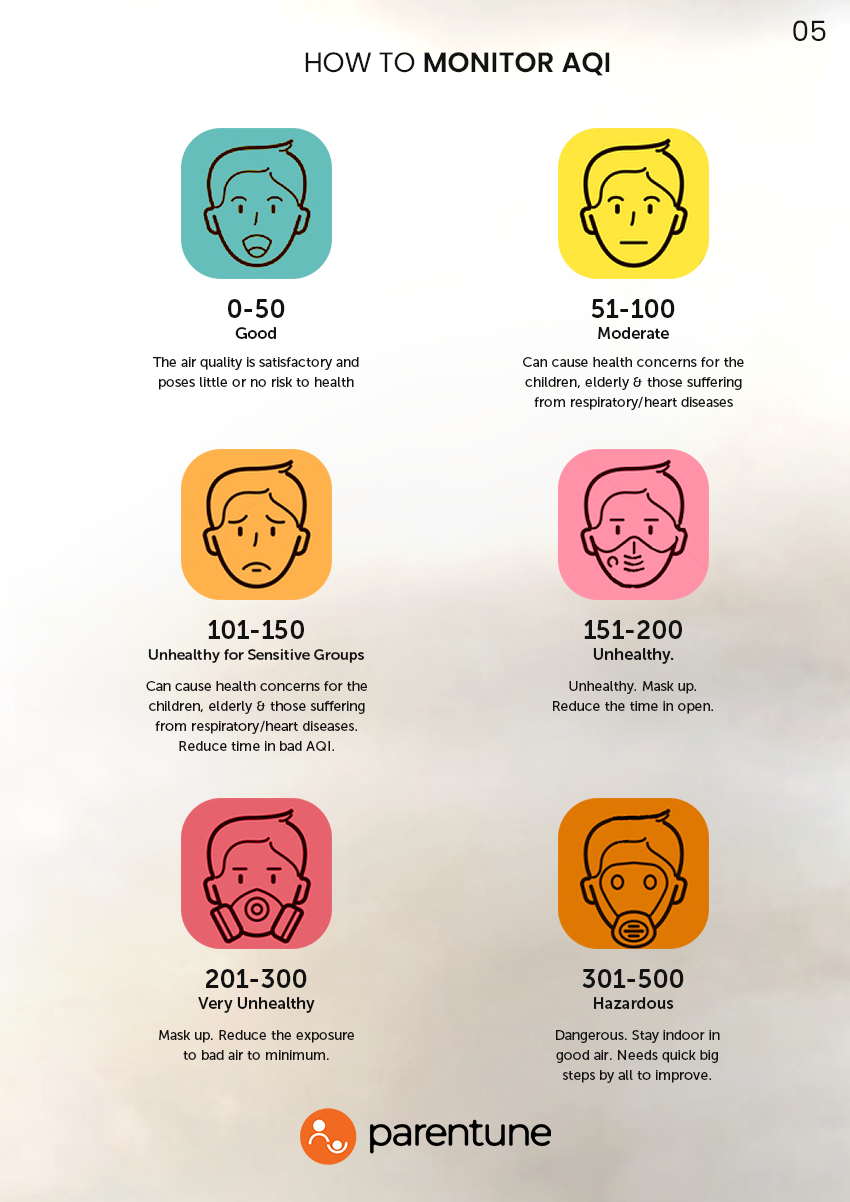
Why Air Pollution is a Big Problem
Air pollution is the presence of harmful substances in the air that we breathe. These substances can be in the form of gases, particles, or droplets. They can come from various sources, such as vehicles, industries, power plants, fires, agriculture, and household activities. Air pollution can affect the environment, climate, and human health in many ways.
More reports are coming about respiratory issues in children, such as coughing, wheezing, asthma attacks, and pneumonia. These symptoms are caused by the irritation and inflammation of the airways and lungs due to the inhalation of pollutants such as particulate matter, ozone, nitrogen dioxide, sulfur dioxide, and carbon monoxide. These pollutants can also damage the lung function and development of children, making them more vulnerable to chronic respiratory diseases in the future.
According to the World Health Organization (WHO), air pollution is one of the leading environmental risk factors for death and disease worldwide. It is estimated that air pollution causes about 7 million premature deaths every year, mainly due to heart disease, stroke, lung cancer, and chronic respiratory diseases. Air pollution also contributes to the global burden of disease, reducing the quality of life and increasing the health care costs of millions of people.
According to the State of Global Air 2020 report, more than 116,000 infants in India died within a month of birth in 2019 due to air pollution.
Facts You Must Know About Air Pollution
1. Being exposed to air pollution over a long period of time can change your child’s brain structure and lower their ability to do well in school and focus during exams. It is advisable to avoid exposing a baby or a toddler to air pollution levels above 150 AQI, as it may cause breathing discomfort or respiratory illness.
2. Early exposure to air pollution can have lifelong effects on your child’s life such as:
-
Stunted lung growth and brain development delay
-
Asthma
-
Psychological and Behavioral problems like ADHD and even psychotic experiences in adolescence
-
Anxiety and Depression
3. Poor school air quality can also contribute to asthma attacks, headaches, fatigue, nausea, and rashes. It can worsen learning and behavioral disorders and increase absenteeism.
5. Children are more vulnerable to bad AQI because they breathe faster, have smaller lungs, and are still developing their immune and respiratory systems.
6. Exposure to air pollution can increase the risk of cognitive impairment, attention deficit hyperactivity disorder (ADHD), autism spectrum disorder (ASD), and mental health problems in children.
7. India has more polluted cities than any other country: 22 of the 30 most polluted cities in the world are in India, and almost 99 percent of Indians breathe air that is above the WHO’s defined safety limits.
Watch out - Signs & Symptoms
Some of the things that you should watch out for to protect your child from the effects of poor air quality are:
1. Symptoms of respiratory problems such as:
-
Coughing, wheezing, shortness of breath, chest tightness, and difficulty breathing.
These symptoms may indicate that your child has asthma, bronchitis, pneumonia, or other lower respiratory infections, which can be caused or worsened by air pollution. You should seek medical attention if your child has persistent or severe symptoms, or if your child has a history of respiratory diseases.
2. Signs of cardiovascular problems such as:
-
Palpitations, chest pain, dizziness, fainting, and swelling of the legs or feet.
These signs may indicate that your child has high blood pressure, heart attack, stroke, or other cardiovascular diseases, which can be caused or worsened by air pollution. Parents should seek medical attention if the child has any of these signs, or if the child has a family history of cardiovascular diseases.
3. Signs of neurological problems such as:
-
Poor memory, low attention span, difficulty learning, poor academic performance, and behavioral changes.
These signs may suggest that your child has cognitive impairment, learning disabilities, or mental disorders, which can be caused or worsened by air pollution. You should consult with the child’s teacher, counselor, or doctor if your child has any of these signs, or if your child has a developmental delay or a neurological condition
Which plants can you grow indoors?
1. Peace lily - This is an excellent indoor plant. It eliminates all kinds of harmful gases and dust that come from different places. This also makes the air that comes into the house quite clean.
2. Swan lily - This plant keeps the humidity and vapor in the air. It absorbs harmful gases like xylene and toluene.
3. Areca palm - This plant converts carbon dioxide into oxygen. It also purifies the air. If you plant this plant, you should clean its leaves daily.
4. English ivy - This plant gives pure air by eliminating all kinds of poisonous gases in the environment.
5. Aloe vera - Aloe vera not only has medicinal properties, but it also has the ability to protect us from air pollution.
6. Boston fern - This plant absorbs dangerous gases like benzene and xylene. Rubber plant - This plant also purifies the air by removing the poisonous particles in the air.
7. Sansevieria plant - This plant is very effective in reducing air pollution. It flourishes in any condition. It can absorb more than 100 chemicals. It also releases oxygen at night and eliminates many kinds of harmful gases.
8. Money plant - This plant absorbs CO-2 in the air and releases oxygen. It reduces CO-2 in the air and gives us pure oxygen to breathe.
9. Snake plant - This plant is also known as the snake plant. It also has the ability to filter and clean the air.
10. Pine plant (cedar plant) - This plant also purifies the air and removes the poisonous particles in it.
11. Bamboo palm - This plant cleans the air of chemicals like benzene, formaldehyde, and trichloroethylene and keeps the humidity in the air.
How many plants can you grow indoors?
You can plant one plant per 100 square feet, i.e. if you have a 1000 square foot house, you can house 10-11 plants.
We want to protect each child from air pollution. We dream of a day when each child would be able to freely breathe clean air. You can read in more detail on how to protect a child from air pollution.
Frequently Asked Questions (FAQs)
1. Is it true that over 90% of the world's population is breathing unsafe air?
A: Yes, that's sadly correct. More than 90% of the global population is inhaling air that's not good for health.
2. Are children more prone to the effects of air pollution?
A: Absolutely. Kids are like little sponges, and sadly, they soak up more of the harmful impacts of air pollution.
3. How can we shield our kids from air pollution?
A: Keep them indoors when pollution levels are high, use air purifiers at home, and plant some green buddies (trees!) around your living space.
4. Does air pollution harm babies?
A: Yes, it can. Babies are delicate, and dirty air can affect their tiny lungs. Extra care is a must!
5. Does pollution impact pregnancy?
A: Unfortunately, yes. Pregnant moms need to be cautious as pollution can pose risks to both mom and baby.
6. Can pollution affect fertility?
A: It's a concern. High pollution levels may impact fertility. Taking steps to reduce exposure is a good idea for aspiring parents.
7. What signs of air pollution exposure should I watch for?
A: Keep an eye out for coughing, wheezing, or eye irritation. If your child shows these signs, it's time to take action against the polluted air around.
Remember, Each Child deserves the gift of clean air!
Reference:
1. Power MC, et al. (2019) Exposure to air pollution as a potential contributor to cognitive function, cognitive decline, brain imaging, and dementia: A systematic review of epidemiologic research. Neurotoxicology. 70: 87–97
2. Sunyer J, Esnaola M, Alvarez-Pedrerol M, Forns J, Rivas I, et al. (2015) Association between Traffic-Related Air Pollution in Schools and Cognitive Development in Primary School Children: A Prospective Cohort Study. PLoS Med 12(3): e1001792.
3. Every Third Child In Delhi Has Impaired Lungs: NDTV Study
Be the first to support
Be the first to share
Comment (0)
Related Blogs & Vlogs
No related events found.
Loading more...